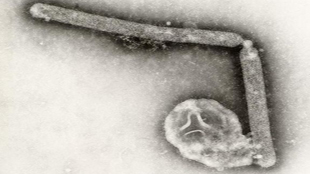 Two avian influenza A (H5N1) virionsWIKIMEDIA COMMONS, CYNTHIA GOLDSMITH/JACKIE KATZ
Two avian influenza A (H5N1) virionsWIKIMEDIA COMMONS, CYNTHIA GOLDSMITH/JACKIE KATZ
Despite positive recommendations by the National Science Advisory Board for Biosecurity (NSABB) and the US Department of Health and Human Services to publish in full the results of two H5N1 studies that managed to make the virus transmissible between ferrets, the director of the National Institute of Allergy and Infectious Diseases (NIAID) Anthony Fauci and others recommended that researchers respect "an extension on the moratorium" on such dual use research, ScienceInsider reported.
"The question is for how long," Fauci said while addressing a US Senate Committee on Homeland Security and Governmental Affairs last week.
The original 60-day voluntary moratorium on H5N1 transmissibility research was initiated by a letter signed by 39 influenza researchers on January 20, and was then extended by a World Health Organization ...





















